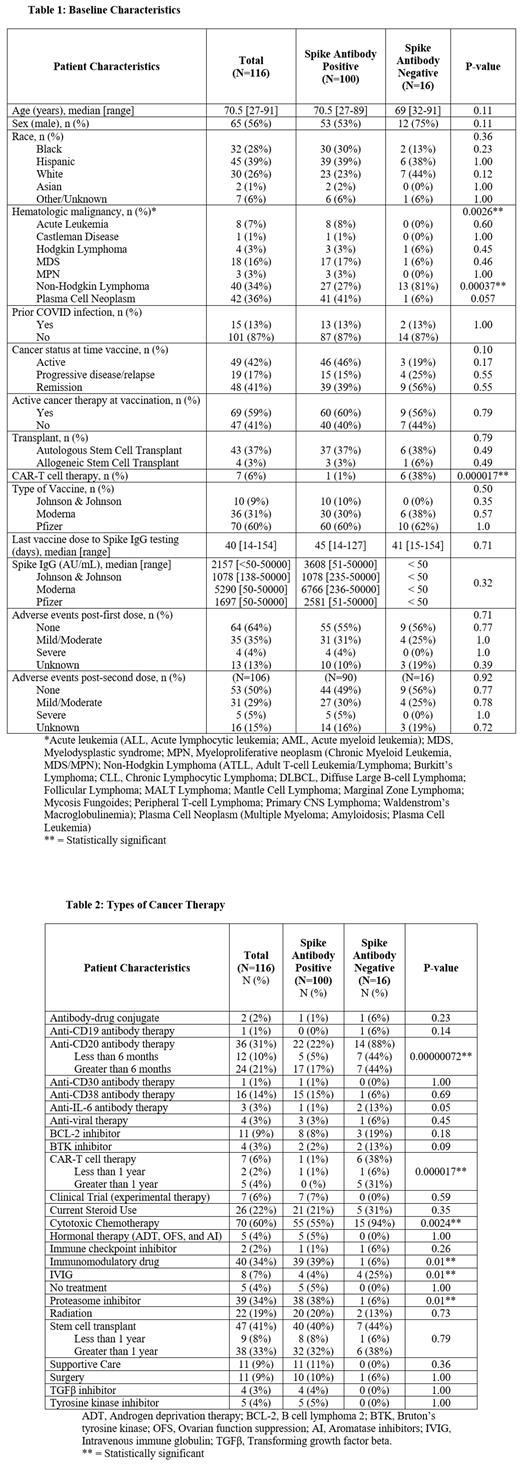Abstract
It is well established that COVID-19 carries a higher risk of morbidity and mortality in patients (pts) with hematologic malignancies. Emerging data suggests that despite the 3 COVID-19 vaccines with emergency use authorization (EUA) by the FDA inducing high levels of immunity in the general population, pts with hematologic malignancies have lower rates of seroconversion for the SARS-CoV-2 Spike antibody (Spike IgG) and thus possibly lower protection against severe COVID-19. We established a program of rapid vaccination and evaluation of response in an inner city minority population to help determine the factors that contribute to the poor seroconversion to COVID-19 vaccination in pts with hematologic malignancies.
We conducted a cross-sectional cohort study of pts with hematologic malignancies seen at Montefiore Medical Center between March 29, 2021 and July 8, 2021 who completed their vaccination series with 1 of the 3 FDA EUA COVID-19 vaccines, Moderna, Pfizer, or Johnson & Johnson (J&J). We qualitatively measured Spike IgG production in all pts using the AdviseDx Spike IgG assay and performed quantitative analysis on pts who completed their vaccination series with at least 14 days (d) after the 2 nd dose of the Moderna or Pfizer vaccines or 28d after the single J&J vaccine. Safety data was collected via questionnaires or as part of the electronic medical record. We analyzed the characteristics of these pts using standard descriptive statistics and associations between pts characteristics, cancer subtypes, treatments, and vaccine response using a Fisher Exact test, Kruskal-Wallis Rank Sum test, or Kendall Tau-b test.
A total of 121 pts with hematologic malignancies were enrolled and another 10 pts were included by retrospective chart review. Five pts did not have a Spike IgG performed after consent and excluded. Ten patients had Spike IgG testing before completion of their vaccination series and excluded from quantitative analyses. A total of 116 pts were included in immunogenicity analysis and 106 pts in quantitative analysis. Baseline characteristics and representative malignancies are listed in Table 1. Seventy pts (60%) received Pfizer, 36 pts (31%) Moderna, and 10 pts (9%) J&J. Median time from vaccination completion to Spike IgG was 40d. We observed a high-rate of seropositivity (86%) with 16 pts (14%) having a negative Spike IgG. Percent positivity was not statistically significant between vaccine types (p=0.50).
We observed significantly lower seroconversion rates in pts with Non-Hodgkin lymphoma (p=0.005) and pts who received: cytotoxic chemotherapy (p=0.002), IVIG (p=0.01), CAR-T cell therapy (p=0.00002), and CD20 monoclonal antibodies (Ab) (p=0.0000008) especially within 6 mo of Spike Ab evaluation (p=0.01). All pts who received anti-CD19 (Axi-cel) CAR-T therapy (0/6) were seronegative, and 1 pt that received BCMA directed CAR-T (Cilta-cel) was seropositive with no association between timing CAR-T cell infusion and seroconversion/titer. Use of BCL2 inhibitors (p=0.04), CD20 monoclonal Ab (p=0.0009), CAR-T cell therapy (p=0.01), BTK inhibitors (p=0.04), current steroid use (p=0.002), and IVIG (p=0.003) also correlated with significantly lower Ab titers with a trend toward lower Ab titers in pts on any active cancer therapy at time of vaccination (p=0.051). Immunomodulatory drugs (p=0.01) and proteasome inhibitors (p=0.01) had significantly higher seroconversion rates, and pts with history prior COVID-19 (12/106) had significantly higher Ab titers (p=0.0003). Of 47 pts who received stem cell transplant, 43 received an autologous (37 seropositive, 6 seronegative) and 4 an allogeneic transplant (3 seropositive, 1 seronegative), with no significant association with seroconversion, Ab titer, or time since transplant (greater or less than 1 year). The majority of pts, 64% and 53%, reported no adverse effects (AE) to the 1 st and 2 nd dose respectively. The most common AE were mild in severity and included sore arm, muscle aches, fatigue, and fever. No life-threatening AE were observed.
Our findings indicate that vaccination is safe, effective, and well tolerated in the majority of pts with hematologic malignancies. We observed that pts receiving B-cell depleting therapies are unable to mount an effective serological response to COVID-19 vaccines and remain vulnerable to the disease. Novel immunization strategies (active or passive) are urgently needed in this population.
Gritsman: iOnctura: Research Funding. Shastri: Onclive: Honoraria; Kymera Therapeutics: Research Funding; Guidepoint: Consultancy; GLC: Consultancy. Halmos: Merck: Membership on an entity's Board of Directors or advisory committees, Research Funding; Bristol Myers Squibb: Membership on an entity's Board of Directors or advisory committees, Research Funding; Astra-Zeneca: Membership on an entity's Board of Directors or advisory committees, Research Funding; Amgen: Membership on an entity's Board of Directors or advisory committees, Research Funding; AbbVie: Research Funding; Boehringer-Ingelheim: Membership on an entity's Board of Directors or advisory committees, Research Funding; Novartis: Membership on an entity's Board of Directors or advisory committees, Research Funding; GSK: Research Funding; Pfizer: Membership on an entity's Board of Directors or advisory committees, Research Funding; Mirati: Research Funding; Elevation: Research Funding; Blueprint: Research Funding; Advaxis: Research Funding; Eli-Lilly: Research Funding; TPT: Membership on an entity's Board of Directors or advisory committees; Apollomics: Membership on an entity's Board of Directors or advisory committees; Guardant Health: Membership on an entity's Board of Directors or advisory committees. Verma: BMS: Research Funding; GSK: Research Funding; Novartis: Consultancy; Stelexis: Consultancy, Current equity holder in publicly-traded company; Eli Lilly: Research Funding; Curis: Research Funding; Medpacto: Research Funding; Incyte: Research Funding; Acceleron: Consultancy; Stelexis: Current equity holder in publicly-traded company; Celgene: Consultancy; Throws Exception: Current equity holder in publicly-traded company.


This feature is available to Subscribers Only
Sign In or Create an Account Close Modal